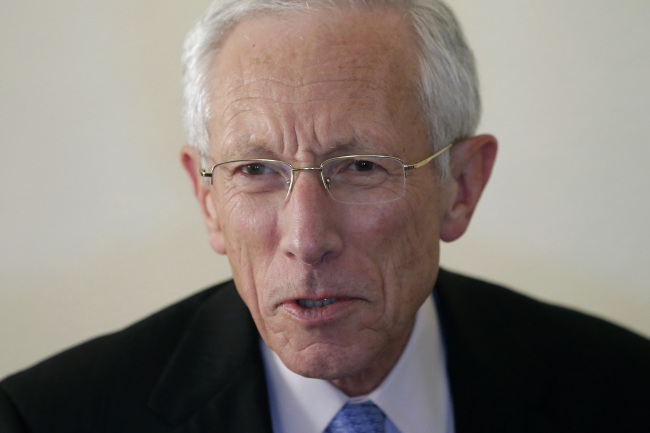Bank of Israel Governor Stanley Fischer said the world is “awfully close” to a recession, and backed the Federal Reserve’s increase in quantitative easing as strengthening its policy credibility.
While there has been “a lot of progress made” to improve the global economy, its impact hasn’t materialized, Fischer said in an interview in Tokyo with Bloomberg Television airing Sunday. He signaled that by deciding not to set an end date or total amount to its third program of bond buying, the Fed is easing worries it will run out of ammunition before achieving its goals.
Fischer’s take on global growth added to concern raised at annual meetings of the International Monetary Fund, with the IMF cutting its forecasts on Oct. 9 and warning of more weakness unless the U.S. and Europe address threats to their economies. As the euro crisis drags on, fiscal tightening and muted demand in wealthy nations hurts emerging countries from China to Brazil.
 |
Stanley Fischer (Bloomberg) |
“We’re awfully close” to a global recession, said Fischer, 69, who served as the IMF’s No. 2 official from 1994 to 2001 and was thesis adviser to Fed Chairman Ben S. Bernanke at the Massachusetts Institute of Technology. “It’s pretty slow right now. Europe is technically in a recession, the U.S. is predicting less than 2 percent growth for the next few months.”
The Europeans are making headway with plans for a fiscal and banking union, and the U.S. is in “pretty good shape” other than its fiscal position, the former Citigroup Inc. vice chairman said in the Saturday interview.
“Feelings have improved a lot but it’s a little early to say we are coming out of it,” said Fischer, who has headed Israel’s central bank since 2005, accepting a second term in 2010.
Fischer declined to comment on the outlook for Israel’s interest rates. The Bank of Israel last cut its benchmark in June. He said that Prime Minister Benjamin Netanyahu’s decision to call early elections in response to a budget impasse is a “good move” that will benefit the Middle East nation’s economy. Netanyahu opted against a “very expansionary budget” that might have resulted from the current coalition administration, he said.
The Fed in September said it will purchase $40 billion in mortgage bonds a month and hold the main interest rate near zero until at least mid-2015. Bernanke that stimulus will be expanded until policy makers see “sustained improvement” in the labor market and that the strategy works in part by boosting the prices of assets such as equities.
“It’s certainly had an impact so far,” Fischer said. “Instead of saying it will be a given amount, $500 billion or whatever, saying we will keep doing this at $40 billion a month until the unemployment rate comes down to a level that we regard as satisfactory, I think that adds to the credibility of these measures.”
The U.S. jobless rate fell to 7.8 percent in September, the lowest level since President Barack Obama took office in January 2009, a government report showed Oct. 5.
The Fed’s policies have come under scrutiny from government officials and some business people. Indian Finance Minister Palaniappan Chidambaram told U.S. Treasury Secretary Timothy F. Geithner the easing may push commodity prices higher, while Brazilian Finance Minister Guido Mantega said in Tokyo that QE3 risks aggravating currency problems for emerging markets.
Bernanke Saturday rebutted concern that QE3 is causing destabilizing flows to emerging-market economies. “It is not at all clear that accommodative policies in advanced economies impose net costs on emerging market economies,” he said in prepared remarks for a seminar in Tokyo.
Gary D. Cohn, Goldman Sachs Group Inc.’s president and chief operating officer, said Oct. 11 the U.S. central bank will struggle to end its quantitative easing program.
Fischer disagreed.
“You have a bunch of central bankers in the U.S. that know how to deal with this,” he said. “Selling securities is not uncharted territory.”
The Fed isn’t alone in easing monetary policy, with the European Central Bank and Bank of Japan (8301) both adding to stimulus in the past three months.
The ECB cut its benchmark interest rate to a record low of 0.75 percent and pledged to buy the bonds of governments that agree to austerity conditions. The BOJ last month boosted its asset-purchase fund by 10 trillion yen ($128 billion) and abandoned a minimum yield for the bonds it purchases.
ECB President Mario Draghi has “certainly taken a big chunk” off the risk of a euro breakup, said Fischer, who also taught Draghi at MIT. The ECB unveiled details of its bond program on Sept. 6 and said it will spend as much as needed to restore confidence to government bond markets, provided countries sign up to budget consolidation measures first.
“It’s not a complete plan yet because countries have to request assistance and accept conditions that go with it,” said Fischer, who sees a bigger probability now that European governments will accept austerity programs in exchange for ECB aid. “It could take a while to put in place but it certainly makes a huge difference to the issue of will somebody deal with this issue of interest rates that are already too high for certain countries.”
Fischer said joint euro-area debt, or euro bonds, “will be a mistake” as there is little in the system that will force countries to keep their budgets under control. German Chancellor Angela Merkel’s government has long opposed an imminent switch to a full-scale common borrowing system using euro bonds.
“If you let everybody sell euro bonds, you don’t have market discipline on individual countries,” Fischer said. “The markets have to judge the credit of individual countries and make those who are not doing what’s needed” pay through higher borrowing costs, he said.
(Bloomberg)








